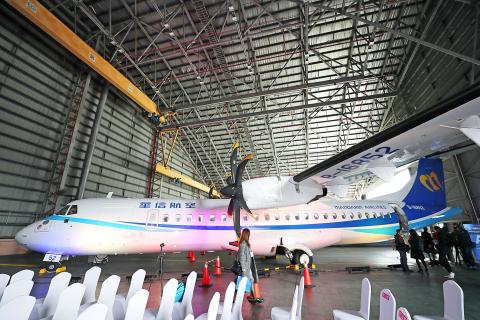Mandarin Airlines (華信航空), a subsidiary of China Airlines Ltd (CAL, 中華航空), yesterday inaugurated its new fleet of ATR 72-600 aircraft, in time for next month’s Lunar New Year holiday.
Two of the new aircraft have reached the fourth stage of the Civil Aeronautics Administration’s five-stage certification process, and the carrier is expected to deploy the airplanes for flights to the nation’s outlying islands and other domestic routes, Mandarin Airlines chairman Hsieh Shih-chien (謝世謙) said at the inauguration ceremony at Taipei International Airport (Songshan airport).
The new routes are to include daily flights between Kaohsiung and Penghu County’s Magong City; between Taichung and Hualien County; and between Taipei and Magong City, Hsieh said.

Photo: CNA
Mandarin Airlines plans to expand its ATR 72-600 fleet to nine aircraft before the end of 2020, Hsieh said.
The carrier took delivery of three aircraft at the end of last year, and expects to receive another two in June or July, he said.
Previously, the airline operated domestic routes with its fleet of Brazilian-made Embraer SA E190 twin-engine regional jets, which led to steep losses due to high fuel and operating costs, Hsieh said.
The new fleet allows the carrier to improve flight frequency to the outlying islands and other domestic destinations, he added.
The Embraer jets are designed for flights of between one-and-a-half hours and two hours, which is not ideal for domestic flights, as they average between 30 minutes and 40 minutes flight time, Hsieh said.
The ATR 72-600 are turboprops, which are ideal for short-haul flights and fuel efficiency, he said, adding that the aircraft also has lower emissions.
Although the airline is focused on improving its domestic routes, it would continue its international flights to cities in China, which are served by its fleet of Boeing Co 737-800 aircraft.
CAL chairman Ho Nuan-hsuan (何煖軒), who also attended the ceremony, said that the company has inked agreements with a number of foreign partners to improve pilot training and maintenance for the ATR 72-600.
CAL canceled plans to purchase ATR 72-600’s that were operated by now-defunct TransAsia Airways Corp (復興航空), because it declined to consent to in-depth inspections prior to sale, Ho said.
CAL has acquired TransAsia Airway’s hangar at Songshan airport to service the new fleet, he said.

STEEP DECLINE: Yesterday’s drop was the third-steepest in its history, the steepest being Monday’s drop in the wake of the tariff announcement on Wednesday last week Taiwanese stocks continued their heavy sell-off yesterday, as concerns over US tariffs and unwinding of leveraged bets weighed on the market. The benchmark TAIEX plunged 1,068.19 points, or 5.79 percent, to 17,391.76, notching the biggest drop among Asian peers as it hit a 15-month low. The decline came even after the government on late Tuesday authorized the NT$500 billion (US$15.2 billion) National Stabilization Fund (國安基金) to step in to buoy the market amid investors’ worries over tariffs imposed by US President Donald Trump. Yesterday’s decline was the third-steepest in its history, trailing only the declines of 2,065.87 points on Monday and

TAKING STOCK: A Taiwanese cookware firm in Vietnam urged customers to assess inventory or place orders early so shipments can reach the US while tariffs are paused Taiwanese businesses in Vietnam are exploring alternatives after the White House imposed a 46 percent import duty on Vietnamese goods, following US President Donald Trump’s announcement of “reciprocal” tariffs on the US’ trading partners. Lo Shih-liang (羅世良), chairman of Brico Industry Co (裕茂工業), a Taiwanese company that manufactures cast iron cookware and stove components in Vietnam, said that more than 40 percent of his business was tied to the US market, describing the constant US policy shifts as an emotional roller coaster. “I work during the day and stay up all night watching the news. I’ve been following US news until 3am

Six years ago, LVMH’s billionaire CEO Bernard Arnault and US President Donald Trump cut the blue ribbon on a factory in rural Texas that would make designer handbags for Louis Vuitton, one of the world’s best-known luxury brands. However, since the high-profile opening, the factory has faced a host of problems limiting production, 11 former Louis Vuitton employees said. The site has consistently ranked among the worst-performing for Louis Vuitton globally, “significantly” underperforming other facilities, said three former Louis Vuitton workers and a senior industry source, who cited internal rankings shared with staff. The plant’s problems — which have not

TARIFF CONCERNS: The chipmaker cited global uncertainty from US tariffs and a weakening economic outlook, but said its Singapore expansion remains on track Vanguard International Semiconductor Corp (世界先進), a foundry service provider specializing in producing power management and display driver chips, yesterday withdrew its full-year revenue projection of moderate growth for this year, as escalating US tariff tensions raised uncertainty and concern about a potential economic recession. The Hsinchu-based chipmaker in February said revenues this year would grow mildly from last year based on improving supply chain inventory levels and market demand. At the time, it also anticipated gradual quarter revenue growth. However, the US’ sweeping tariff policy has upended the industry’s supply chains and weakened economic prospects for the world economy, it said. “Now